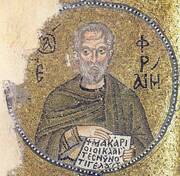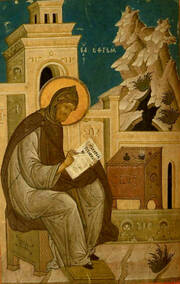Saint Ephrem the Syrian
Syrica deacon & Doctor of the Church - from (modern-day) Turkey
Born c 306 in Nisibis, Mesopotamia
Died on 9 June 373 in Edessa
Prolific Syriac-language humnographer & theologian
Declared Doctor of the Church in 1920
Feast day - 9th June
Catechesis by Pope Benedict XVI
General Audience, Wednesday 28 November 2007 - also in Croatian, French, German, Italian, Portuguese & Spanish
"Dear brothers and sisters,
According to common opinion today, Christianity was a European religion, which the culture of this Continent then exported to other countries. But the reality is far more complex, since the roots of the Christian religion are found in the Old Testament and hence in Jerusalem and the Semitic world. Christianity is always nourished by this root of the Old Testament roots. Also its expansion in the first centuries was both towards the West - towards the Greco-Latin world, where it then inspired European culture - and towards the East, all the way to Persia, to India, contributing thus to inspiring a specific culture, in Semitic languages, with its own identity. To show this cultural pluriformity/pluralism of the one Christian faith in its origins, I spoke in last Wednesday's catechesis of a representative of this other Christianity, Aphraates the Persian sage, who is almost unknown to us. In the same vein/Along the same lines, today I would like to talk about St Ephrem the Syrian, born in Nisibis around 306 into a Christian family. He was the most distinguished representative of Syriac-speaking Christianity and succeeded in reconciling in a unique way the vocation of theologian and that of poet. He was formed/educated and grew up next to/beside James, Bishop of Nisibis (303-338), and together with him founded the theological school of his city. Ordained a deacon, he lived intensely the life of the local Christian community until 363, the year in which/when Nisibis fell into the hands of the Persians. Ephrem then emigrated to Edessa, where he continued his preaching activity /as a preacher. He died in this city in the year 373, victim of the infection/disease contracted while caring for plague sufferers/those infected with the plague. It is not known for certain if/whether he was a monk, but in any case it is sure that he remained a deacon for the whole of/throughout his life and that he embraced virginity and poverty. Thus, the common and fundamental Christian identity appears in the specificity of his own cultural expression: faith, hope - this hope which allows one to live poor and chaste in the world, placing every expectation in the Lord - and finally charity, all the way to the gift of himself in the care of those sick with the plague.
St Ephrem has left us a great theological heritage/inheritance. His considerable production can be grouped into four categories: works written in ordinary prose (his polemical works or biblical commentaries); works in poetic prose; homilies in verse; lastly, hymns, certainly Ephrem's largest work. He is a rich and interesting author in many aspects, but especially from the theological profile. The specificity of his work is that theology and poetry meet in it. Wanting/If we want to approach his doctrine, we must from the outset insist on this: that is/namely, on the fact that he does theology in poetic form. Poetry allows/enables him to deepen his theological reflection through paradoxes and images. At the same time, his theology became liturgy, became music; he was in fact a great composer, a musician. Theology, reflection on (the) faith, poetry, song and praise of God go together; and it is precisely in this liturgical character that (the) divine truth appears with limpidity/clarity in Ephrem's theology. In his search for God, in his theological activity, he follows the pathway of paradox and symbol. He made ample use of contrasting images because they served to underline/emphasize the mystery of God.
I cannot present much of him/his writing now, also/partly because poetry is difficult to translate, but so as to give at least an/some idea of his poetic theology I would like to cite in part two hymns. First of all, (and) also in view of Advent approaching, I (shall) propose to you several splendid images taken from the/his Hymns on the Nativity of Christ. In inspired tones, Ephrem manifests/expresses his wonder before the Virgin:
"The Lord came into/entered her
so as to become/and became (a) servant.
The Word came into/entered her,
so as to keep/and kept silent in her womb.
The lightning/thunder came into/entered her
so as not to/and did not make any noice/his voice was still.
The Shepherd came into/entered her
and here the Lamb was born/he became a Lamb in her, who
quietly weeps/and came forth bleating.
Because/ The womb of Mary
reversed the roles/changed the order of things:
The One/He who created all things / O you who order all
he entered in possession/Rich he went in, but poor/he came out poor.
The Most High came into her [Mary],
but he came out humble.
Splendour/Brightness came into her,
but dressed in humble clothes.
The One/He who bestows all things,
knew hunger.
The One/He who gives drink to all
knew thirst.
Naked and bare he came forth from/out of her,
He who dresses of all things [in beauty]." (Hymn De Nativitate 11, 6-8).
To express the mystery of Christ, Ephrem uses a great diversity of themes, expressions, (and) images. In one of his hymns, he effectively links Adam (in paradise) to Christ (in the Eucharist):
"It was by closing
with the sword of the cherub,
that the pathway of/to the tree of life
was closed.
But for the peoples,
the Lord of this tree
gave his very self as food
in the/his (Eucharistic) oblation.
The trees of Eden
were given as food
to the first Adam.
For us, the gardener
of the Garden in person
made himself food
dddfor our souls.
Indeed, we had all left Paradise together with Adam,
who left it behind him.
Now that the sword has been removed here below (on the Cross),
replaced by the spear,
we can return to it." (Hymn 49: 9-11).
To speak of the Eucharist, Ephrem used two images, embers or burning coal and the pearl. The burning coal theme was taken from the Prophet Isaiah. It is the image of one of the seraphim who picks up a burning coal with tongs and simply touches the lips of the Prophet with it in order to purify them; the Christian, on the other hand, touches and consumes the Burning Coal which is Christ himself:
"In your bread hides the Spirit
who cannot be consumed;
in your wine is the fire that cannot be swallowed.
The Spirit in your bread, fire in your wine:
behold a wonder heard from our lips.
The seraph could not bring himself to touch the glowing coal with his fingers,
it was Isaiah's mouth alone that it touched;
neither did the fingers grasp it nor the mouth swallow it;
but the Lord has granted us to do both these things.
The fire came down with anger to destroy sinners,
but the fire of grace descends on the bread and settles in it.
Instead of the fire that destroyed man,
we have consumed the fire in the bread
and have been invigorated." (Hymn De Fide 10: 8-10).
Here again is a final example of St Ephrem's hymns, where he speaks of the pearl as a symbol of the riches and beauty of faith:
"I placed (the pearl), my brothers, on the palm of my hand,
to be able to examine it.
I began to look at it from one side and from the other:
it looked the same from all sides.
(Thus) is the search for the Son inscrutable,
because it is all light.
In its clarity I saw the Clear One
who does not grow opaque;
and in his purity,
the great symbol of the Body of Our Lord,
which is pure.
In his indivisibility I saw the truth
which is indivisible" (Hymn On the Pearl 1: 2-3).
The figure of Ephrem is still absolutely timely for the life of the various Christian Churches. We discover him in the first place as a theologian who reflects poetically, on the basis of Holy Scripture, on the mystery of man's redemption brought about by Christ, the Word of God incarnate. His is a theological reflection expressed in images and symbols taken from nature, daily life and the Bible. Ephrem gives his poetry and liturgical hymns a didactic and catechetical character: they are theological hymns yet at the same time suitable for recitation or liturgical song. On the occasion of liturgical feasts, Ephrem made use of these hymns to spread Church doctrine. Time has proven them to be an extremely effective catechetical instrument for the Christian community.
Ephrem's reflection on the theme of God the Creator is important: nothing in creation is isolated and the world, next to Sacred Scripture, is a Bible of God. By using his freedom wrongly, man upsets the cosmic order. The role of women was important to Ephrem. The way he spoke of them was always inspired with sensitivity and respect: the dwelling place of Jesus in Mary's womb greatly increased women's dignity. Ephrem held that just as there is no Redemption without Jesus, there is no Incarnation without Mary. The divine and human dimensions of the mystery of our redemption can already be found in Ephrem's texts; poetically and with fundamentally scriptural images, he anticipated the theological background and in some way the very language of the great Christological definitions of the 5th century Councils.
Ephrem, honoured by Christian tradition with the title "Harp of the Holy Spirit", remained a deacon of the Church throughout his life. It was a crucial and emblematic decision: he was a deacon, a servant, in his liturgical ministry, and more radically, in his love for Christ, whose praises he sang in an unparalleled way, and also in his love for his brethren, whom he introduced with rare skill to the knowledge of divine Revelation.
St Ephrem (Commentary on the Diatessaron, ch 16, 9/23; SC 121):
"'Which is the greatest and first commandment of the Law?' Jesus said to him: 'You shall love the Lord your God... and your neighbor as yourself'" (Mt 22, 36-39). Love of God spares us from death and love of our neighbour from sin, for no one sins against someone he loves. But what heart is there able to possess love of neighbour in its fullness? What soul is there able to bring to fruition within herself, with respect to all humankind, the love sown within her by the precept: 'Love your neighbour as yourself'? Our own resources are incapable, of themselves, of effecting this prompt willing, so rich in God. The only thing equal to the task is the fruit of charity, sown by God himself.
By reason of his nature, God can achieve whatever he wants. But what he wants is to give life to men. Angels, kings, prophets.. : all these are past; but humanity was not saved until He, who holds us by the hand and brings us back to life, came down from heaven."

